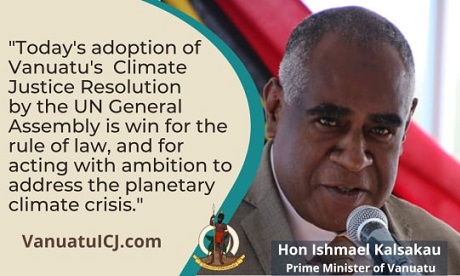The United Nations General Assembly has adopted a Vanuatu-led resolution to protect the rights of current and future generations from the adverse effects of climate change.
Vanuatu’s efforts eventually saw over 150 countries sponsor the resolution to the United Nations.
New Zealand was among the core group of 17 countries that helped draft the Vanuatu-led resolution.
The resolution asks the International Court of Justice (ICJ) to clarify what obligations states have in this respect. It will involve the ICJ preparing an advisory opinion that could be cited in climate court cases.
“Today we have witnessed a win for climate justice of epic proportions,” said Vanuatu Prime Minister Ishmael Kalsakau.
“Vanuatu sees today’s historic resolution as the beginning of a new era in multilateral climate cooperation, one that is more fully focused on upholding the rule of international law and an era that places human rights and inter-generational equity at the forefront of climate decision-making.”
The ICJ opinion’s effect
New Zealand Climate Change Minister James Shaw said the ICJ opinion could have the potential to “change the landscape.”
“It does give more power to the small island states and will enter other small states, because it just helps to build the international rule of law around this.”
He said implications for New Zealand would not be known until the ICJ delivered its findings, but it was clear the world needed to “lift our game.”
Vanuatu is one of the most vulnerable nations to the impacts of climate change. This month two category 4 tropical cyclones hit the country in less than five days.
The damage is estimated to cost Vanuatu more than half its annual gross domestic product.
“Like New Zealand, Vanuatu has been hit by devastating cyclones and storms this year,” Shaw said.
“For all our sakes, we must cut climate pollution so things don’t get even worse.”
Faith-based support
The Laudato Si’ Movement (LSM) is already working collectively on preventing climate pollution.
Last month it released four guides with the aim to ensure sustainable banking, investing, divesting and insurance.
Faith-based groups including Catholic dioceses, universities, schools and religious congregations should align their financial activities with their faith values for sustainable development, LSM suggests.
The movement’s executive director Tomás Insua said the guides support the “ecological conversion” that the pope has called for.
“Many have wondered how to take action on ecological economics. We hope that these guides, created with input from partners around the world, will help point the way forward.”
Source
